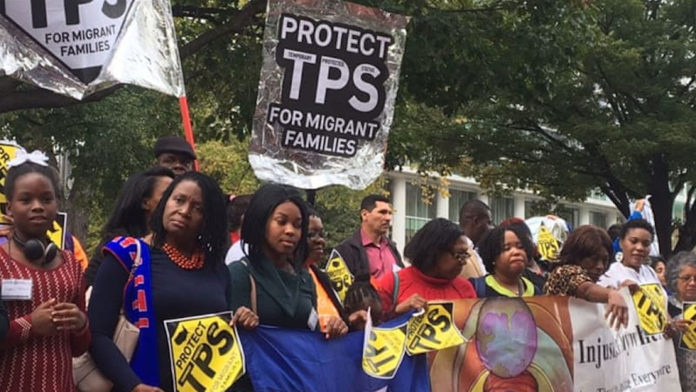
On May 8, the Washington Post broke a story that the U.S. embassies in Haiti, El Salvador, and Honduras warned against ending Temporary Protected Status (TPS) for some 300,000 immigrants from those countries, but then-Secretary of State “Rex Tillerson dismissed the advice and joined other administration officials in pressuring leaders at the Department of Homeland Security [DHS] to strip the immigrants of their protections.”
In a May 4, 2018 letter to the Government Accountability Office (GAO), Sen. Bob Menendez (D-NJ), the ranking Democrat on the Senate Foreign Relations Committee, said that he was “concerned” that Tillerson had told DHS to “terminate the TPS designations for El Salvador, Haiti, and Honduras in deliberate disregard of the counsel and expertise of State Department officials in Washington and at the U.S. Embassies in all three countries.”
Former DHS Chief Elaine Duke, who announced her April resignation in February after less than a year in the post, was brow-beaten (particularly by White House Chief of Staff John F. Kelly) into reluctantly ending TPS for Haiti and El Salvador, the Post reported. She gave Hondurans a six-month evaluation period, at the end of which TPS was revoked earlier this May.
“Tillerson ignored a body of evidence about the negative consequences for U.S. national security and risks to the physical safety of TPS beneficiaries and the U.S.-citizen children that may accompany them to their country of origin.”
The Senate Foreign Relations Committee (SFRC) Democratic Staff was responsible for the revelations and wrote in a May 11, 2018 email that “Tillerson’s recommendation” to “terminate the TPS designations for El Salvador, Haiti, and Honduras was the result of an overtly political process.”
The SFRC Democratic Staff said that “Tillerson ignored a body of evidence about the negative consequences for U.S. national security and risks to the physical safety of TPS beneficiaries and the U.S.-citizen children that may accompany them to their country of origin.”
The three countries’ TPS holders have about 273,000 U.S.-born children who will be torn either from their parents or from their homeland.
President Donald Trump has a signature anti-immigrant and patently racist agenda. On Jan. 11, a bipartisan Congressional delegation tried to convince President Donald Trump to allocate the 50,000 “diversity visas” granted annually to all nations instead to Haitians who had just seen their TPS yanked. In response, Trump asked: “Why do we need more Haitians?… Take them out.” In the same meeting, he referred to Haiti, El Salvador, and African nations as “shithole countries,” and “suggested that the United States should instead bring more people from countries such as Norway,” according to a bombshell story in The Washington Post.
On Sat., May 19, 2018, a multinational coalition called the 1804 Movement for All Immigrants, in concert with organizations from Massachusetts to Florida, is holding a national rally in front of the White House in Lafayette Park and on Pennsylvania Avenue to demand permanent residency for all 400,000 immigrants from 10 countries who currently hold TPS. Six of those countries’ immigrants have had their TPS cut, effective in 2019 or 2020.
In November, Rep. Nydia Velazquez (D-NY) introduced the American Promise Act of 2017, to allow TPS holders, or those with deferred enforced departure (DED), to apply for permanent residency, if they do so within three years of enactment of the bill.
The May 19 rally in Washington, DC is demanding that Trump apologize for his “shithole” statement and back off from his aggressive policies against Palestine, Venezuela, Iran, and Syria. The coalition also calls for U.S. and UN reparations to Haiti, an end to police profiling and terror in the U.S., and the pull-out of the UN occupation forces deployed in Haiti since 2004.










